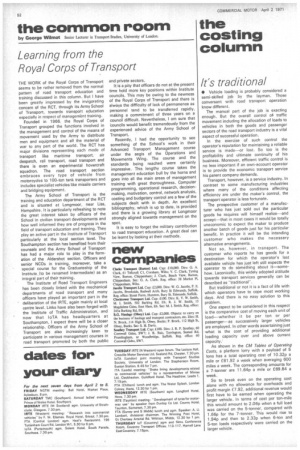the costing column
Page 54

If you've noticed an error in this article please click here to report it so we can fix it.
It's traditional
• Vehicle loading is probably considered a semi-skilled job by the layman. Those conversant with road transport operation know different.
The manual part of the job is exacting enough. But the overall control of, traffic movement including the allocation of loads to vehicles in both the goods and passenger sectors of the road transport industry is a vital aspect of successful operation.
In the exercise of such control the operator's reputation for maintaining a reliable service is made—or lost, So too is the profitability and ultimate continuity of his business. Moreover, efficient traffic control is no less important if an own-account operator is to provide the economic transport service his parent company demands.
Transport, however, is a service industry. In contrast to some manufacturing industries where many of the conditions affecting efficiency are under the maker's control, the transport operator is less fortunate.
The prospective customer of a manufacturer who has just sold out the particular goods he requires will himself realize—and accept—that in most cases it would be totally uneconomic to expect the maker to produce another batch of goods just for his particular benefit. In practice it will be the intending customer who makes the necessary alternative arrangements.
Not so, however, in transport. The customer who reports he has goods for a destination for which the operator's last available vehicle has just left still expects the operator to do something about it—somehow. Laconically, this widely adopted attitude towards transport services generally can be described as "traditional",
But traditional or not it is a fact of life with which operators have to cope most working days. And there is no easy solution to this problem.
One aspect to be considered in this respect is the comparative cost of moving each unit of load--whether it be per ton or per passenger—as successively larger vehicles are employed. In other words ascertaining just what is the cost of providing additional loading capacity over and above current capacity.
As shown in the CM Tables of Operating Costs, a platform lorry with a payload* of 5 tons has a total operating cost of 10.32p a mile or £61.92 a week when averaging 600 miles a week. The corresponding amounts for a 7-tonner are 11.64p a mile or £69.84 a week.
So to break even on the operating cost alone with no allowance for overheads and profit margin £7.92, additional revenue would first have to be earned when operating the larger vehicle. In terms of cost per ton-mile this would amount to 2.06p when a full load was carried on the 5-tonner, compared with 1,66p for the 7-tonner. This would rise to 1.94p and then to 2.33p when 6-ton and 5-ton loads respectively were carried on the larger vehicle.




























































































